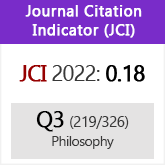On Judith Butler: A Phenomenology of Lived, narrated and Represented Embodiment
DOI:
https://doi.org/10.3989/isegoria.2017.056.12Keywords:
Phenomenology, Queer theory, gender StudiesAbstract
In this paper we take Judith Butler’s thinking as a basis from which to consider the ideas of three authors. In our view, these authors complement Butler’s project of helping excluded people to fight for a dignified life, a “liveable life”; and specifically to the idea of using performative resignifications of discourses and practices. On one hand, we present the writings of Sarah Ahmed and Lanei Rodemeyer; they consider the spatiality and temporality of the lived body (Ahmed) and the relationship between the lived body and discourse (Rodemeyer). In both cases, “pure phenomenology” (and not hermeneutics) is applied to the question of sexual diversity. On the other hand, we delve into the works of Louise Bourgeois, for whom artistic creation is a way of exorcising pain and becoming free of socially constructed prisons. Starting from the paths opened by these authors, we believe that a phenomenology is possible in which there is place for what does not fit into the norm. this phenomenology would make it possible, on one side, to rend visibility to those who do not fit into the established norms and categories and, on another side, to contribute to a reformulation of discourse, such a transformation that allows the excluded to inhabit them. “Pure” phenomenology, that aims at going to “the things themselves” do not naturalise oppressions, but it is rather an ally to recognise, denounce and provide a reparation for them.
Downloads
References
Ahmed, Sarah, Queer Phenomenology, Routledge, Londres, 2006.
Ames, J., (ed.), Sexual Metamorphosis: An Anthology of Transsexual Memoirs, Nueva York, Vintage Books, 2005.
Butler, Judith, Bodies that Matter. On the Discursive Limits of Sex, Routledge, Londres, 1993. traducción castellana: Cuerpos que importan , traducción de Alcira
Bixio, Paidós, Barcelona, 2003.
Butler, Judith, Gender Trouble. Feminism and the Subversion of Identity , 2ª edición, Routledge, Londres, 1999. traducción castellana: El género en disputa. El feminismo y la subversión de la identidad, traducción de María Antonia Muñoz, Barcelona, Paidós, 2007.
Butler, Judith, “Actos performativos y constitución del género: un ensayo sobre fenomenología y teoría feminista”, en Debate feminista , 18 (1998), pp. 296-314.
Husserl, Edmund, Ideas relativas a una filosofía pura y a una filosofía fenomenológica. Libro segundo: Investigaciones fenomenológicas sobre la constitución, traducción de Antonio Zirión, Fondo de Cultura Económica-UNAM, México, 2005.
Husserl, Edmund, La filosofía, ciencia rigurosa , traducción de Miguel García-baró, Encuentro, madrid, 2009.
Jerade Dana, miriam, “Ontología de la vulnerabilidad y políticas del duelo en Judith Butler”, en Revista de filosofía. Open Insight. volumen II. número 11. Enero-junio de 2016 (México).
Levinas, Emmanuel, Ética e infinito, 2ª edición, traducción de Jesús maría Ayuso Díez, Antonio Machado Libros, Madrid, 2000.
Levinas, Emmanuel, Totalidad e infinito, traducción de Miguel García-Baró, Salamanca, Ediciones Sígueme, 2012. PMid:22476642
Llamas, Ricardo, Teoría torcida. Prejuicios y discursos en torno a “la homosexualidad”, Siglo XXI editores, Madrid, 1998.
Lorz, Julienne, y Joos, Petra, Louise Bourgeois. Estructuras de la existencia: las celdas, Comisarias: Julienne Lorz y Petra Joos, Madrid, Editorial La Fábrica, 2016. PMCid:PMC5342772
Rodemeyer, L. “An Application of Husserlian Phenomenology to Questions of Discourse and gender”, en Proceedings of the Husserls Circle. 37th Annual Meeting. Prague, Czech Republic, April 22-28, 2007, pp. 149-152.
Downloads
Published
How to Cite
Issue
Section
License
Copyright (c) 2017 Consejo Superior de Investigaciones Científicas (CSIC)

This work is licensed under a Creative Commons Attribution 4.0 International License.
© CSIC. Manuscripts published in both the printed and online versions of this Journal are the property of Consejo Superior de Investigaciones Científicas, and quoting this source is a requirement for any partial or full reproduction.All contents of this electronic edition, except where otherwise noted, are distributed under a “Creative Commons Attribution 4.0 International” (CC BY 4.0) License. You may read here the basic information and the legal text of the license. The indication of the CC BY 4.0 License must be expressly stated in this way when necessary.
Self-archiving in repositories, personal webpages or similar, of any version other than the published by the Editor, is not allowed.














